SELLING A HELICOPTER
What to look for in a helicopter broker or dealer
There are a lot of choices when it comes to finding the best partner to help you navigate the marketing, regulatory, tax, customs, import/export, and other aspects of buying or selling a helicopter for the best possible price.

By: Jen BoyerPosted on: June 10, 2022
There are a lot of choices when it comes to finding the best partner to help you navigate the marketing, regulatory, tax, customs, import/export, and other aspects of buying or selling a helicopter for the best possible price.
To start, there are basically two types of partners you can choose from: an aircraft broker, or an aircraft inventory dealer or distributor. There are several differences between the two that are worth considering.
Inventory dealers or distributors, much like car dealers, are businesses that buy or trade aircraft inventory for resale and may also distribute brand new or certified pre-owned helicopters from OEMs. The FAA grants dealers “Dealer Registration Certificates,” which act as temporary registration documents that the dealer can use between the time they acquire an aircraft and sell it.
“A dealer buys and resells aircraft, taking actual liability and risk to provide a complete service to the client,” explained Aurélien Blanc, partner at Rotortrade, a helicopter inventory dealer and OEM distributor. “We act as principal towards each of our clients, committing our own capital, assuming risk liabilities, and carrying the cost of the asset until resell.”
Brokers, much like real estate agents, are businesses or individuals who help a buyer or seller with the aircraft transaction. They come in all shapes and sizes, from a person working out of a home office, to a brick-and-mortar office with a hangar and aircraft on site. Brokers typically work on a fixed fee of the aircraft sale.
“There are all kinds of brokers out there, and the same with dealers — to some extent,” said Jamie Chalkley, joint managing director at Eastern Atlantic Helicopters. “You simply have to do your research to find the right fit for you.”
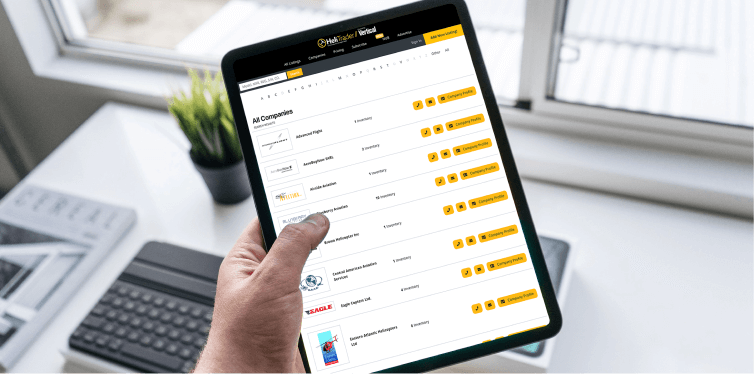
Research is Key
Chalkley recommends buyers and sellers take the time to thoroughly research their partner in aircraft transactions. Google them, he suggests. The business should appear in a few places on the internet, not just its own website, to prove expertise and experience in the industry.
“This research can be particularly hard for someone who doesn’t know the industry because there is a new breed of broker out there — where they can easily put up a fancy website and online showroom with lots of aircraft they don’t own or operate,” said Chalkley.
“At the same time, there are some businesses that are old school with less flashy websites, but they’re very reputable,” he added. “So, I recommend looking deeper. That business or person should appear elsewhere on the web or media with aircraft they’ve operated or things of interest they’ve done in the industry to show their experience and credibility in the field.”
Another thing to research is the broker or dealer’s experience and expertise with the aircraft. The broker or dealer should be very technically familiar with the aircraft type, whether they’re helping a buyer or seller. If you’re looking for a partner to sell your aircraft, ask about their experience with that type; at the same time, watch for key questions you should be asked, including: Why are you selling it? Where was it maintained? And how was it operated?
“If a seller comes to me, I check them out,” said Chalkley.
“When I take on the aircraft, my reputation is on the line. I get copies of the run sheets to scan and see what the maintenance quality is like. I ask for photographs to see condition. Putting my name to it… I want to represent aircraft that are accurately represented and are good value. These, in my opinion, are signs of a reputable partner.”
Jamie Chalkley, joint managing director at Eastern Atlantic Helicopters
Buyers can also identify a good aircraft transaction partner by the questions asked. A good broker or dealer will ask what you plan to do with the aircraft you seek to buy; if you have experience with the aircraft; if this type of aircraft can be maintained in your area, etc. This is all to ascertain if you are a good fit for the aircraft, or if perhaps a different aircraft would better meet your needs.
A broker with a strong knowledge and understanding of the aircraft and its similar models will do a much better job of helping you find the right aircraft for you, Chalkley said. It’s in their best interest to ensure you’re happy with what you buy, not just that you buy.
“They should also understand the transaction,” he added. “They should be familiar with escrow. They should be familiar and happy to talk with lawyers and attorneys and financial institutions. They should have a strong understanding of shipping, tax and VAT, import/export details, and be very comfortable with putting together, writing, and interpreting contracts. If they hesitate on expressing comfort and understanding of any of these, that’s a good sign to look elsewhere.”
In addition to Chalkley’s advice, Rotortrade’s Blanc recommends asking about how that potential partner will support you with logistical, technical, engineering, legal, and financial support in your aircraft transaction.
“Buyers and sellers should look for someone who does more than just put two parties in contact,” noted Blanc. “They should look for someone who can support them during the inspection by being physically present, and show local knowledge of the market and of rules of export-import in case of cross-border transactions. They should find someone familiar with logistics implications and someone strong enough to ensure a smooth sale, despite issues at delivery or any other complication.”
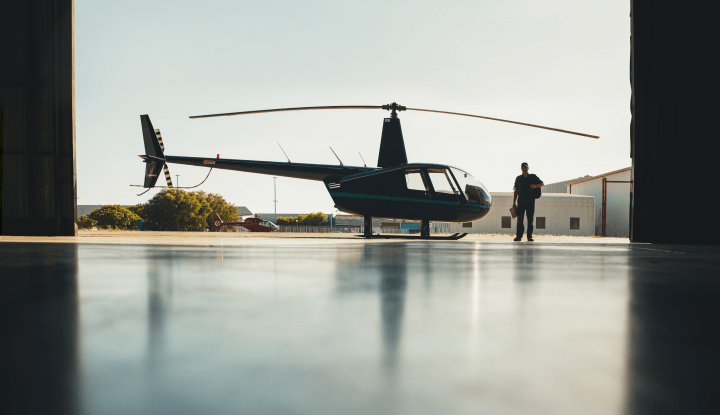
Red Flags
Just as there are key positive things to seek in a broker or dealer, there are also pitfalls to avoid.
“Checking the history and size of the organization versus the number of helicopters advertised can give buyers and sellers some warning — though that alone is not sufficient,” said Blanc. “The lack of a physical office, no online presence, and no representation or exhibition at airshows are also factors that indicate a weakly capitalized company, which is something to look out for when dealing with expensive assets with high liabilities.”
Also, is there an actual company employee who is close to the aircraft? And can they get you information on it swiftly while also responding to your questions expeditiously? If not, this is a red flag. While the market is global, helicopters have limited range and are local in nature. Being able to provide local support and industry knowledge is critical, added Blanc.
Chalkley recommends also looking at a company’s overall aircraft-to-staff ratio. If a company has 25 to 30 aircraft all around the world listed for sale, but only one or two people in a single location, chances are high that neither are very informed on details about every aircraft.
Another red flag is when an aircraft is listed by multiple parties. While this might be the owner’s strategy, you as a buyer run the risk of working with a broker that is not as informed on the aircraft as one that has exclusive sales rights. It can also lead to a bidding war and higher chances of a bad outcome.
Another big warning sign is if the broker or dealer is only posting ads for their aircraft on free sites. Serious businesses have established marketing strategies to reach potential buyers where they are, and that includes paid advertising. If a partner you’re researching only posts ads in places where there is no cost to advertise, you run the risk of poor response.
“In the end, you’re going to find what look like some red flags everywhere, but look at all the other sides of a broker or dealer,” said Chalkley. “If you have mostly green flags and can mitigate the red ones, chances are you’ve found a good match.”
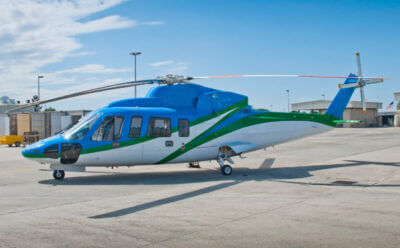
Sikorsky S76C++
Make an offer
Year: 2008
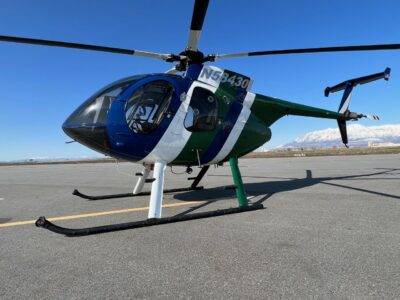
MD Helicopters MD500D
Contact seller for price
Year: 1979
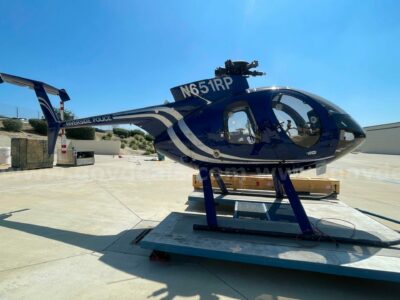
MD Helicopters 369E
USD $ 244,000
Year: 2008

Airbus AS350B3+
Contact seller for price
Year: 2010
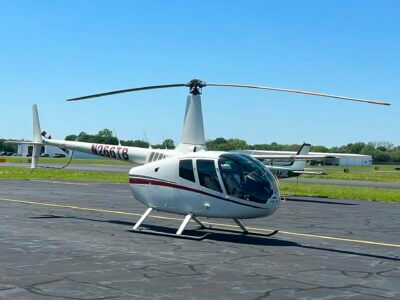
Robinson R66 Turbine
USD $ 785,000
Year: 2015
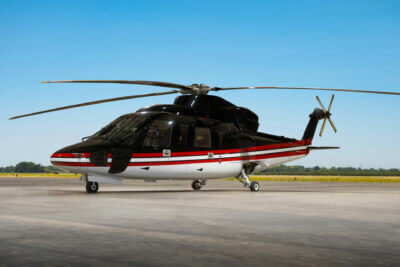
Sikorsky S76C+
Contact seller for price
Year: 1999
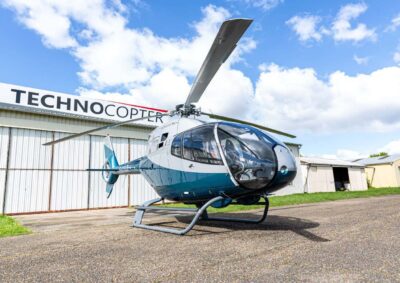
Airbus EC120B
Make an offer
Year: 2002
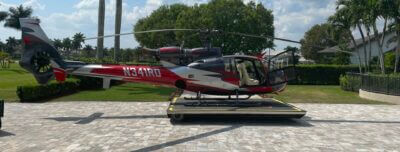
Airbus SA341
USD $ 695,000
Year: 1976
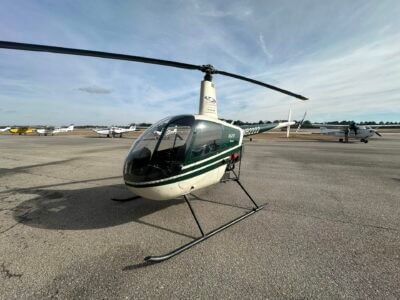
Robinson R22 Beta
USD $ 163,000
Year: 1988
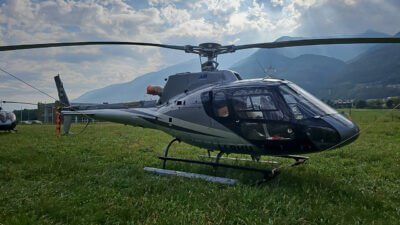
Airbus H125
Contact seller for price
Year: 2023







